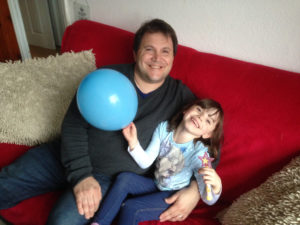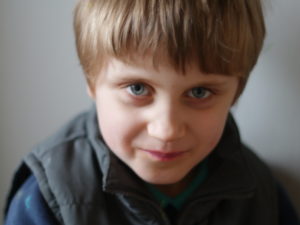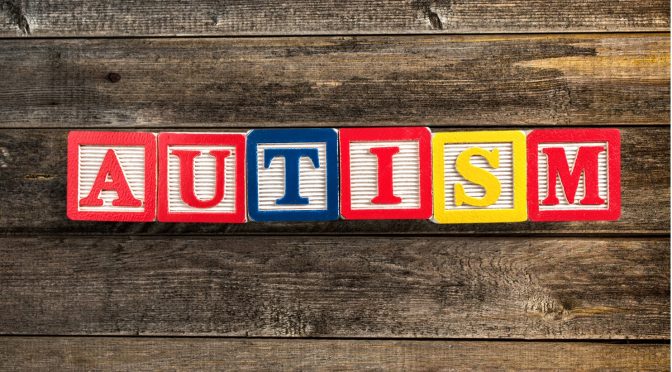In his job as ‘The Gadget Man’ Matt Porter tests and reviews cool techie stuff, but gadgets also play a critical role in his personal life. They support the unique needs of his 7-year-old twins James and Grace, who have autism.
 Autism is a lifelong, developmental disorder that affects a person’s ability to communicate and relate to other people, and how that person experiences the world. It’s estimated that about 1 in 100 people are on the autism spectrum, with symptoms usually becoming apparent from early childhood. Some autistic people also have learning disabilities, mental health issues or other conditions, meaning they need different levels of support.
Autism is a lifelong, developmental disorder that affects a person’s ability to communicate and relate to other people, and how that person experiences the world. It’s estimated that about 1 in 100 people are on the autism spectrum, with symptoms usually becoming apparent from early childhood. Some autistic people also have learning disabilities, mental health issues or other conditions, meaning they need different levels of support.
To help raise people’s understanding of the condition for World Autism Awareness Day, Matt shared his family’s story with This Is MedTech.
“James is profoundly autistic, non-verbal, with developmental delays. Gracie is low functioning with learning delays,” explains Matt. Autism has no cure but there are various tools that can help autistic people to learn, communicate and cope with their individual challenges.
Although James doesn’t speak, he’s able to communicate simple concepts such as “I like” using a basic sign language called Makaton. He goes to a special school where the students use Makaton as well as iPads with digital versions of picture exchange communication, a system that allows people with little or no communication abilities to ‘talk’ and learn using pictures. Grace goes to a mainstream school with one-to-one support, and her iPad also plays a major role in her schooling.
There is a plethora of educational apps available for autistic children, and a great resource is the charity Autism Speaks, which has a comprehensive list of apps that each come with a scientific evidence rating. Being a tech-guy and an app designer himself, Matt would love to one day write an app to help James with his specific communication needs. “There’s no reason why this kind of thing can’t be customised,” he points out.
Wearable technologies that can be used at home are also beginning to pop up. One system uses the fundamentals of neurofeedback to stimulate the brain via tailor-made audio signals, relaxing the minds of children with autism and eventually making them more responsive, communicative, focused and interactive. What does The Gadget Man think of this? “If it works, anything that gives relief is positive,” says Matt.
Basic medical devices like weighted jackets and belts are indispensable for navigating the daily challenges that Matt and his family face. “James gets very frustrated and once he has a meltdown, there’s no reversing it,” he says. “His special weighted belt helps calm him down. He’s very sensory driven so when he gets upset, that provides some comfort. He also has a custom-made wheelchair for this purpose, and a little padded ‘safe room’ within his bedroom.”
The importance of early diagnosis
Matt and his wife Vanessa were already noticing significant differences between the twins before they were two years old. “With James there was a lot of repetitive behaviour, like pacing and constantly spinning objects,” he recalls. “Once we brought our concerns to the attention of doctors, we were quite quick in getting a diagnosis.”
Grace’s symptoms were harder to spot and thus her diagnosis came a bit later, when she started falling behind at school. “She also suffers from anxiety and takes things very literally. She becomes easily obsessed with things, too.”
Matt believes that getting an early diagnosis is key in managing the condition. “We were fortunate to get a swift diagnosis for James. It allowed us to learn about autism, as well as try to initiate communication and start looking into where James could go to nursery and eventually school.”
At the moment diagnosis can be complicated as there’s no single test for autism, but scientists continue to carry out research into identifying biological and genetic markers that may one day open up the door to more straightforward testing and personalised medical treatments.
This article was originally published on This is Medtech and was written by Karen Finn
Anna Kurcirkova from Masters in Communication has written a really good article on how Autism affects communication and what is being done to improve it.
AUTISM: HOW IT AFFECTS COMMUNICATION AND THE WAY PEOPLE ARE WORKING TO IMPROVE IT
Update: July 2020
Wendy Rhodes has written an extremely detailed and interesting article about Autism Spectrum Disorder (ASD) and Attention Deficit Hyperactivity Disorder (ADHD). I encourage you to read it on Weighted Blanket Guides.

